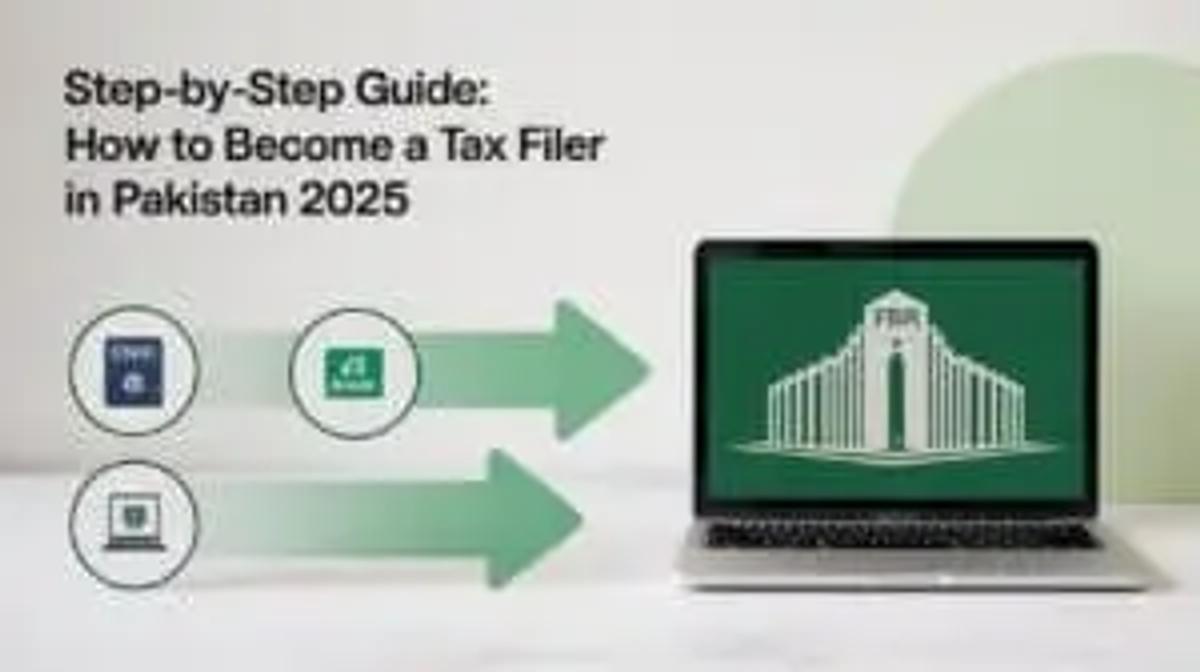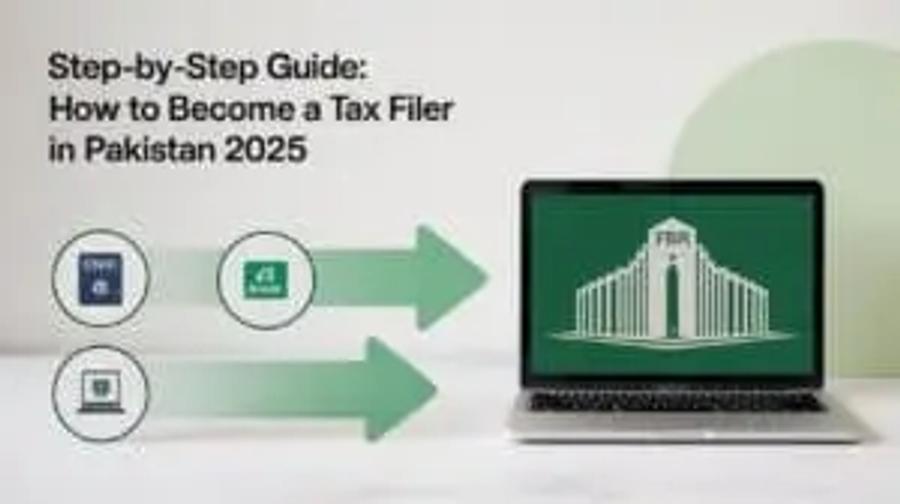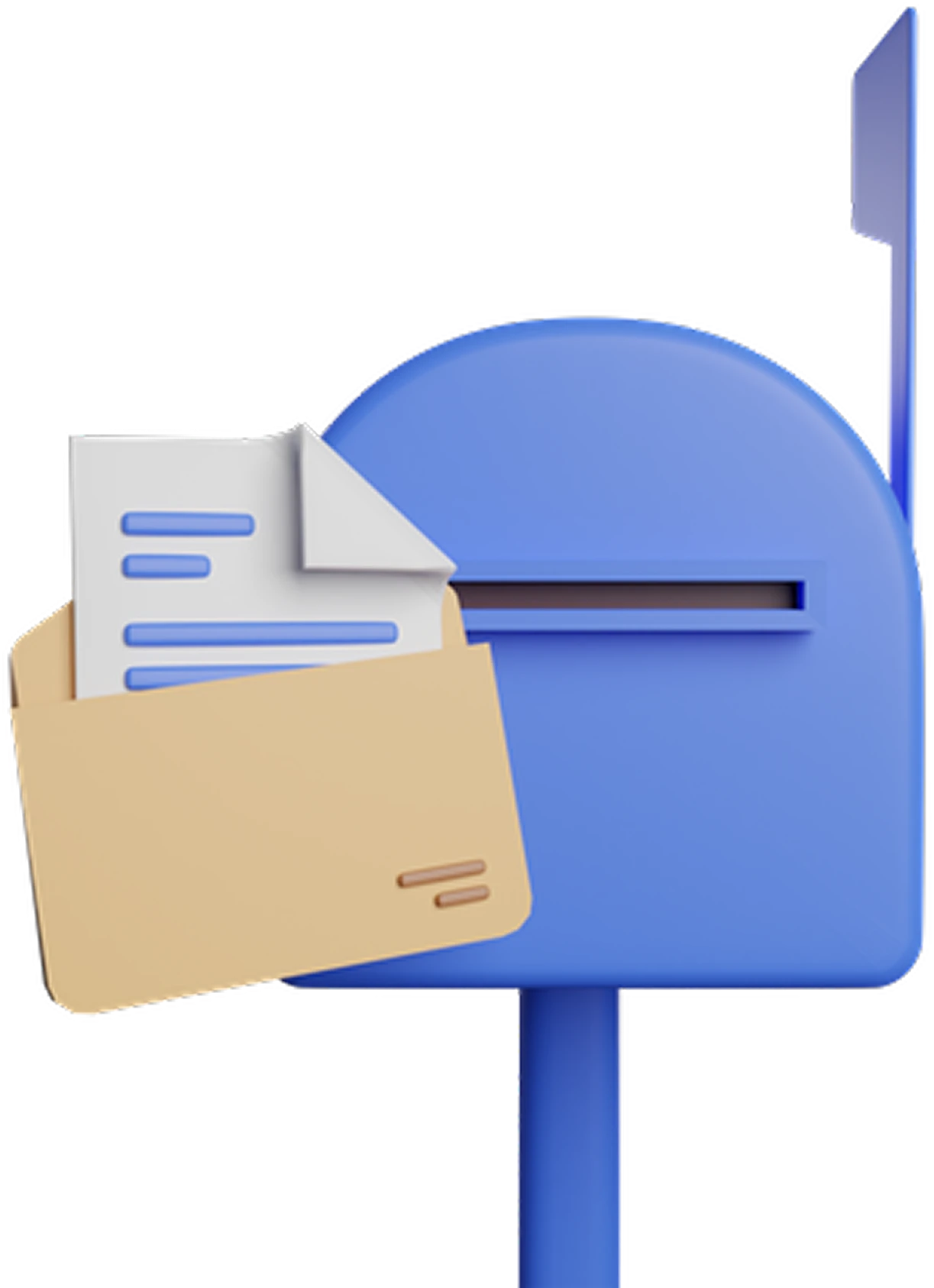How to Become a Filer in Pakistan (2025) – Step-by-Step Guide & Benefits

Ever wondered why some people pay less tax on property purchases or bank transactions in Pakistan? The secret lies in their filer status. If you're tired of facing higher withholding tax rates or want to unlock financial benefits that non-filers miss out on, you're in the right place.
Becoming a tax filer in Pakistan isn't just about compliance—it's about smart financial planning. With the Federal Board of Revenue (FBR) making the process easier through the IRIS portal, there's never been a better time to get your tax affairs in order. Whether you're a salaried employee, freelancer, or business owner, this guide walks you through everything you need to know about becoming a filer in 2026.
What is a Filer in Pakistan?
A filer in Pakistan is simply someone who files their annual income tax return with the FBR, regardless of whether they owe any tax or not. Once you submit your tax return, your name appears on the Active Taxpayers List (ATL), and you officially become a filer.
Think of it this way: filing your tax return is like registering yourself with the tax system. Even if your income falls below the taxable income threshold, submitting a return makes you a filer and gives you access to numerous financial advantages.
The difference between a filer and an active taxpayer is minimal—both terms essentially mean the same thing. Once you're on the ATL Pakistan list, you enjoy lower withholding tax rates and fewer restrictions on financial transactions.
Why Becoming a Filer Matters in 2026
Pakistan's tax system heavily favors filers over non-filers. The government uses this distinction to encourage tax compliance and broaden the tax base. Here's why filer status in Pakistan has become essential:
Lower Tax Rates: Filers pay significantly less withholding tax on various transactions. For example, when withdrawing cash from banks above certain limits, filers face much lower rates compared to non-filers. The tax rate difference between filer and non-filer Pakistan can be as high as 100% or more in some cases.
Property and Vehicle Purchases: Want to buy a house or car? Being a filer saves you substantial money. Property purchase benefits for filers include lower capital gains tax and reduced advance tax rates. Similarly, vehicle purchase benefits for filers mean paying less tax at the time of registration.
Banking Freedom: Bank transaction limits for filers are more flexible. Non-filers face restrictions and higher taxes on large withdrawals and transfers.
Business Advantages: If you run a business, filer status is practically mandatory for smooth operations. From opening corporate bank accounts to participating in government tenders, being on the Active Taxpayers List opens doors.
Who Should Become a Filer in Pakistan?
You should consider becoming a tax filer if you fall into any of these categories:
- Salaried individuals with taxable income (even if tax is already deducted at source)
- Business owners and self-employed professionals earning above the minimum income threshold
- Freelancers receiving payments from Pakistani or international clients
- Property owners planning to buy or sell real estate
- Anyone making large bank transactions regularly
- Students or individuals preparing for future business ventures
Can you become a filer without income in Pakistan? Yes, absolutely. Even if you don't have taxable income, filing a nil return can give you filer status and protect you from higher withholding taxes in the future.
Step-by-Step Guide to Become a Filer in Pakistan 2026
Step 1: Get Your National Tax Number (NTN)
Your NTN is like your tax identity card. If you don't have one, here's the NTN application process:
- Visit the FBR IRIS portal at iris.fbr.gov.pk
- Click on "Registration" and select "Registration for Individuals"
- Fill in your CNIC details and personal information
- Upload required documents (CNIC copy, recent photograph)
- Submit your application online
- Your NTN will be generated instantly
The entire process takes just 10-15 minutes, and you can apply for NTN online without visiting any FBR office.
Step 2: Register on the FBR IRIS Portal
Once you have your NTN, you need IRIS login credentials:
- Go to the IRIS portal
- Select "E-Enrollment"
- Enter your NTN and CNIC number
- Create a secure password
- Set up two-factor authentication FBR for security
- Verify your mobile number and email
The FBR registration procedure is completely digital, making it convenient to register as filer FBR from anywhere in Pakistan.
Step 3: Download and Fill Your Tax Return Form
The tax return filing process involves choosing the right form:
- Salary Return (Form 114): For salaried individuals
- Business Return (Form 116): For business owners and self-employed
- Asset Declaration (Form 116A): Required with your business return
How to download tax return form in Pakistan:
- Log into your IRIS account
- Navigate to "Returns" section
- Select the appropriate return type for Tax Year 2026
- Download the return form in Excel or online format
Fill in all sections accurately, including your income sources, deductions, and wealth statement if applicable.
Step 4: Calculate Your Tax Liability
Understanding income tax slabs Pakistan helps you calculate what you owe:
For salaried individuals in 2026, tax calculation follows progressive slabs. Your employer typically deducts tax at source, but you still need to file a return to become a filer.
Use the FBR income tax calculator available on the IRIS portal for accurate calculations. Factor in any tax already deducted and claim rebates if eligible.
Step 5: Pay Your Tax (If Applicable)
If you owe additional tax:
- Generate a tax challan through IRIS
- Use Challan PSID for online payment method
- Pay through internet banking or visit designated bank branches
- Attach payment proof with your return
FBR e payment makes tax payment Pakistan hassle-free.
Step 6: Submit Your Return Online
The final step in the FBR online registration process for filers:
- Upload your completed return on IRIS
- Attach required documents (salary certificates, bank statements)
- Review all information carefully
- Submit electronically
- Save and print your acknowledgment receipt
Your return submission date determines your filer status. Make sure you file before the income tax return filing deadline Pakistan 2026, typically September 30th for salaried individuals.
Step 7: Verify Your Filer Status
After submission, verify you're on the Active Taxpayers List:
- Visit FBR's website
- Go to "Taxpayer Profile Inquiry"
- Enter your CNIC or NTN
- Check your status on the ATL
How to verify filer status on FBR website takes just seconds. You can also use FBR filer status check online by CNIC option.
Documents Required to Become a Filer
What documents are required to become a filer? Here's your checklist:
- Original CNIC and photocopy
- Previous year's tax return (if applicable)
- Salary certificates or income proof
- Bank statements

- Business registration documents (for businesses)
- Property documents (if you own property)
- Investment statements
Document submission for filers is mostly digital through the IRIS portal.
How Long Does It Take to Become a Filer in Pakistan?
The entire process from registration to appearing on the ATL takes approximately:
- NTN generation: Instant
- IRIS enrollment: 24-48 hours
- Return filing: 1-2 hours (depending on complexity)
- ATL inclusion: 2-3 days after filing
So realistically, you can become a filer within a week if you have all documents ready.
Filer vs Non-Filer: Understanding the Difference
- The benefits of being a filer vs non-filer in Pakistan are substantial:
- Transaction Type
- Filer Rate : 0.3%
- Non-Filer Rate: 0.6%
- Bank Cash Withdrawal
- Property Purchase filer: 2%
- Property Purchase filer Non Filer : 5%
- Vehicle Purchase
- Lower advance tax
- Higher advance tax
- Foreign Remittance
- Minimal restrictions
- Heavy restrictions
- Business Operations
- Full access
- Limited access
Non-filers face penalties including higher withholding taxes, restrictions on purchasing property above certain values, and limitations on vehicle registrations.
How to Maintain Filer Status in Pakistan
Getting filer status is one thing; maintaining it requires:
- Filing annual tax returns before the deadline every year
- Ensuring your return is complete and accurate
- Paying any tax due on time
- Updating your profile on IRIS if your information changes
Missing a single year's filing can remove you from the Active Taxpayers List and revert you to non-filer status.
Common Challenges and Solutions
Challenge: "I don't understand tax calculations." Solution: Consider taking a taxation course in Pakistan or hire a tax consultant. Cities like Karachi, Lahore, and Islamabad have numerous tax filing services Pakistan.
Challenge: "What if I make a mistake in my return?" Solution: You can file a revised return if you discover errors. The FBR allows corrections within a specified timeframe.
Challenge: "I received an income tax notice after filing." Solution: Income tax notices reasons vary—respond promptly with required documents. Most notices are routine requests for clarification.
Learning Tax Compliance: Why Professional Knowledge Matters
Understanding taxation isn't just for accountants. Whether you're filing personal returns or managing business taxation, having solid knowledge helps you:
- Optimize legitimate deductions
- Avoid compliance mistakes
- Plan taxes efficiently
- Understand your rights and obligations
For those serious about tax expertise, institutions like the Institute of Corporate Taxation (ICT) offer comprehensive taxation courses. From diploma in taxation to advanced certificate in taxation (ACIT), these programs cover everything from IRIS portal mastery to tax audit defense.
Taxation training programs benefit various professionals including CA students, ACCA students, freelancers, entrepreneurs, and corporate professionals. Short taxation courses and weekend taxation programs make learning flexible for working professionals.
Career Opportunities in Taxation
With increasing tax compliance requirements, demand for tax professionals has soared. Taxation career opportunities in Pakistan include:
- Tax consultants earning competitive incomes
- FBR positions (check FBR jobs 2026 regularly)
- Corporate tax managers
- Freelance tax advisors offering remote tax services
A certification from recognized institutions combined with practical IRIS portal and e-filing expertise can lead to high-paying taxation careers.
Location-Specific Resources
Need help becoming a filer? Resources vary by city:
Karachi: Visit the FBR Karachi office or find tax consultants in major commercial areas.
Lahore: The FBR Lahore office handles registrations, or access services online.
Islamabad: FBR headquarters in Islamabad offers comprehensive support.
Rawalpindi: Income tax office Rawalpindi serves the twin cities area.
Similar services exist for filer registration in Peshawar, tax filing services in Multan, and FBR offices in Faisalabad and Quetta.
Future of Tax Filing in Pakistan
Pakistan's taxation system is evolving rapidly. Digital tax transformation includes:
- AI in taxation Pakistan for faster processing
- Automated tax filing systems
- Blockchain applications for transparency
- Enhanced FBR digitalization
The government continues implementing tax reforms 2026 to simplify compliance and expand the tax base. Staying updated through FBR's official channels ensures you remain compliant.
Frequently Asked Questions
What is the minimum income to become a filer? There's no strict minimum income requirement to file a return. Even if your income is below the taxable threshold, you can file a nil return and become a filer. For salaried individuals in 2026, income above certain levels becomes taxable, but filing is beneficial regardless.
Can students become filers in Pakistan? Yes, students can become filers even without regular income. If you're planning future business activities, freelancing, or want to establish early tax compliance, filing as a student is permitted and can be advantageous.
What is the last date to file tax return in 2026? For salaried individuals, the deadline is typically September 30, 2026. Business filers usually have until October 31, 2026. However, FBR may announce extensions—check official notifications for confirmation of the tax filing deadline.
Do I need a lawyer or consultant to become a filer? No, you don't need professional help for simple returns. The IRIS portal is user-friendly for basic filing. However, if you have multiple income sources, business income, or complex financial situations, hiring a tax consultant in Islamabad, Karachi, or your city can ensure accuracy.
How can I check if I am a filer online? Visit the FBR website, go to "Taxpayer Profile Inquiry," and enter your CNIC or NTN. The system instantly shows your filer status. You can also check through the FBR filer status check online service available 24/7.
What happens if I don't become a filer? Non-filers face higher withholding tax rates on all transactions—from bank withdrawals to property purchases. You'll also face restrictions on buying property above Rs. 5 million and vehicles above certain engine capacities. The financial disadvantages add up quickly.
Conclusion
Becoming a tax filer in Pakistan in 2026 is simpler than ever, thanks to the FBR IRIS portal and streamlined processes. The advantages of being a filer—from lower tax rates to unrestricted financial transactions—far outweigh the minimal effort required to file annual returns.
Whether you're a salaried employee looking to reduce withholding taxes, a freelancer wanting tax compliance, or a business owner needing legitimacy, obtaining filer status should be your priority. The step-by-step guide above gives you everything needed to get on the Active Taxpayers List.
Don't let another year pass as a non-filer. Take control of your tax status today and unlock financial benefits you've been missing out on.
Ready to Master Taxation?
Understanding tax filing is just the beginning. If you want comprehensive knowledge of Pakistan's tax system, from advanced compliance to professional practice, consider enrolling in a structured program. The Institute of Corporate Taxation (ICT) offers expert-led taxation courses covering everything from basic filing to complex tax planning, IRIS portal mastery, and professional certification.
Whether you're in Karachi, Lahore, Islamabad, or anywhere in Pakistan, ICT's weekend and evening classes make professional tax education accessible. Their diploma in taxation and advanced certificate programs have helped thousands build successful careers in taxation.
Book your seat at ICT's Advanced Taxation Course today and transform from a taxpayer to a tax expert.
Disclaimer: Tax laws and procedures may change. Always verify current requirements on the official FBR website or consult a certified tax professional for your specific situation.

